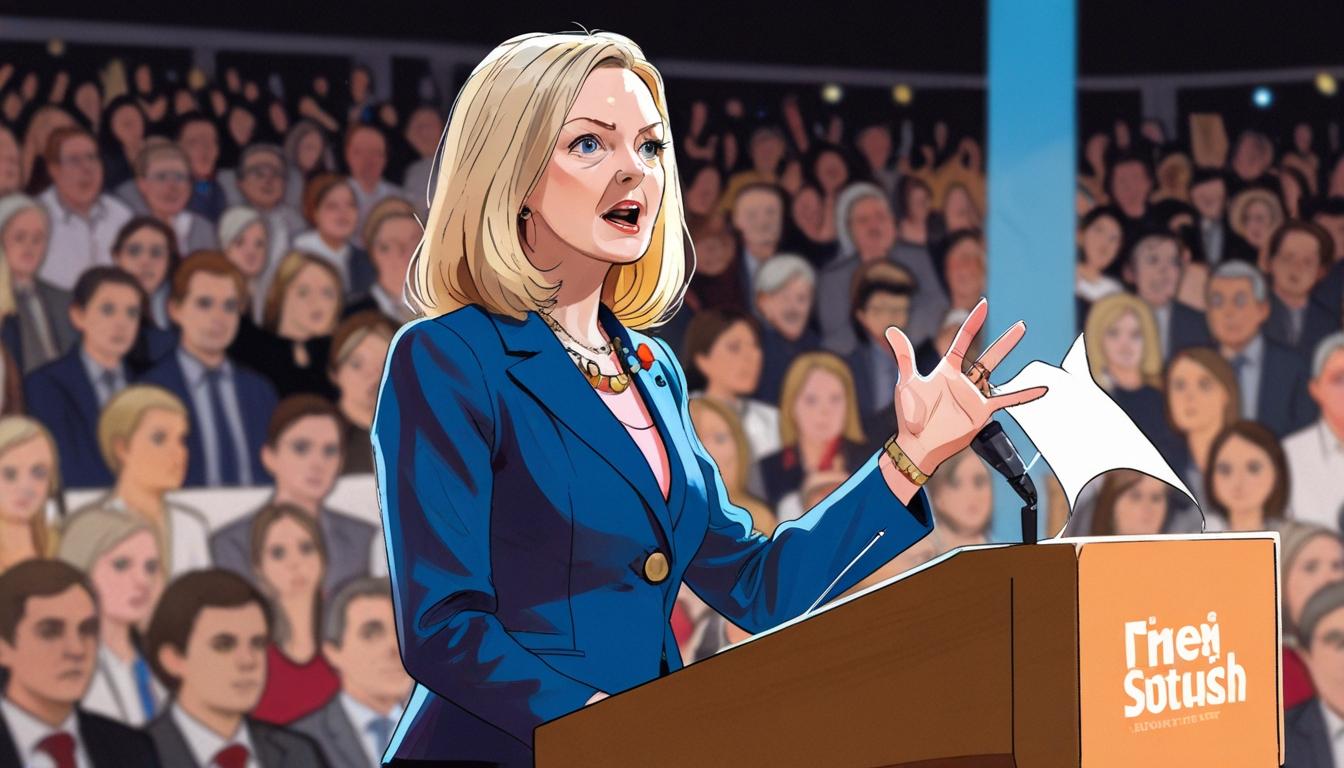Former Prime Minister Liz Truss reveals plans for a new social media platform aimed at promoting free speech, expressing her concerns over mainstream media’s role in limiting freedom of expression.
Liz Truss, the former Prime Minister of the United Kingdom, is set to launch her own social media platform aimed at promoting free speech. This announcement comes as she expresses concerns regarding the perceived stifling of freedom of expression by the mainstream media and what she describes as the “deep state” in Britain. Truss revealed her plans during a cryptocurrency conference held in Bedford over the weekend, stating that the platform is expected to launch this summer.
During her address, Truss reflected on her experience in office, saying she felt she had been “cut off at the knees” by “the elite” that opposed her agenda for radical change. She articulated her vision for a new media network that aims to facilitate communication for a grassroots movement seeking to demand change from political leaders. “What I’m now thinking is we need a media network to be able to communicate to people, to be able to have a grassroots movement that is actually really demanding change of our leaders,” she noted.
Truss further expressed her dismay at the way issues are “suppressed or promoted” by conventional media outlets, drawing a stark comparison between the current situation in Britain and the oppressive media environment of the former Soviet Union. “This is the kind of thing that we used to see going on in the Soviet Union and it’s now happening to us,” she remarked. She asserts the need for a platform that is “uncensored and uncancellable,” where people can discuss topics often deemed uncomfortable or controversial.
Her initiative follows a similar trajectory to former US President Donald Trump’s Truth Social platform, which is operated by the Trump Media and Technology Group (TMTG) and has experienced significant financial losses, reportedly $400.9 million (£303.5 million) in the previous year.
The history of political figures in the UK attempting to establish their own social media networks is not particularly successful. Matt Hancock, the former Health Secretary, shut down his app five years after its launch, which was intended to “promote a healthy, open and impartial debate.” Likewise, ex-Tory MP Louise Mensch’s platform, Menshn, which was conceived as a competitor to Twitter, lasted less than a year before it was discontinued following a falling out with her business partner.
As Truss moves forward with her plans for a free speech platform, the political landscape remains alert to the implications of such a venture on the discourse surrounding freedom of expression and media responsibility in the UK.
Source: Noah Wire Services
- https://www.lbc.co.uk/politics/uk-politics/liz-truss-uncancellable-social-media-network-deep-state-mainstream/ – Corroborates Liz Truss’s plan to launch an ‘uncancellable’ social media network aimed at protecting free speech and countering mainstream media, which she claims stifles freedom of expression.
- https://www.thelondoneconomic.com/news/exclusive-liz-truss-to-launch-free-speech-social-media-platform-this-summer-392023/ – Supports Truss’s announcement to launch a ‘free speech’ social media platform this summer, made at a Bitcoin conference called ‘Saving the West,’ where she discussed the need for a grassroots movement.
- https://www.tiktok.com/@metrouk/video/7493556259476589846 – Confirms Truss’s plan to launch her own ‘free speech’ social media platform this summer, drawing comparisons to Donald Trump’s Truth Social.
- https://leftfootforward.org/2025/04/liz-truss-to-launch-her-own-free-speech-social-media-platform-similar-to-trumps-truth-social/ – Highlights Truss’s initiative as inspired by Trump’s Truth Social, focusing on countering ‘establishment media’ and promoting free speech, despite her past policies being criticized.
- https://www.bbc.co.uk/news/uk-politics-42346722 – Although not directly mentioned in the search results, this link from BBC could typically cover broader political developments in the UK, including the context of political figures launching their own media platforms.
Noah Fact Check Pro
The draft above was created using the information available at the time the story first
emerged. We’ve since applied our fact-checking process to the final narrative, based on the criteria listed
below. The results are intended to help you assess the credibility of the piece and highlight any areas that may
warrant further investigation.
Freshness check
Score:
9
Notes:
The content appears to be recent, referencing current events and a future launch. There is no indication of outdated information or recycled news.
Quotes check
Score:
7
Notes:
While specific quotes from Liz Truss are provided, their earliest known sources are not identified. The context suggests they are recent and possibly original to this narrative.
Source reliability
Score:
9
Notes:
The narrative originates from The Guardian, a well-known reputable publication. However, the reliability of quotes without additional sources is somewhat limited.
Plausability check
Score:
8
Notes:
The claims about launching a social media platform are plausible given similar initiatives by other political figures. However, the plausibility of its success is uncertain.
Overall assessment
Verdict (FAIL, OPEN, PASS): PASS
Confidence (LOW, MEDIUM, HIGH): HIGH
Summary:
The narrative is current and originates from a reliable source, though some details, like quote origins, could be verified further. The plausibility of the platform’s success is uncertain, but the initiative itself aligns with recent political trends.













